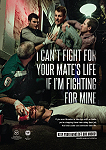PDF 563 KB
Keep your hands off our Ambos! poster reminding people that Ambos cannot help your mate if they are having to protect their own life
 Our Ambos constantly operate in the most extreme and uncertain of situations.
Our Ambos constantly operate in the most extreme and uncertain of situations.
They are the 'front line' of health care and exist primarily to respond to acute emergency situations. Every call they attend places paramedics and ambulance officers in unknown and potentially dangerous situations.
While other health professionals operate in fixed and familiar environments where they have a complete understanding of their physical surrounds, paramedics and ambulance officers work in completely unfamiliar and often highly volatile environments.
Yes, sometimes on the job Ambos face:
Ambos have to contend not only with the needs of their patients, but also with members of the public who through anxiety, deliberate belligerence or intoxication, can exhibit the most aggressive and violent forms of challenging behaviour.
A significant amount of challenging behaviour is encountered in metropolitan and regional licensed venues as the result of drug or alcohol intoxication. Challenging behaviour for our Ambos also occurs commonly in the home as a result of pre-loading alcohol intoxication.
The impact of 'less serious' challenging behaviour, such as verbal abuse, can be accumulative. The innuendo, derogatory or offensive remarks, insults, overt displays of aggression, and at times inappropriate touching and threat to gender safety particularly for female staff that make up 45% of the paid and volunteer workforce, are all often mediated by compassion for the patient's circumstances. The acts frequently go unreported, or are simply tolerated as 'part of the job'. Despite this tolerance, these behaviours are not an acceptable part of the job and over time contribute to staff attitude, low morale and diminished self-worth.
Respect our Ambos because they're here to help. Make it socially unacceptable amongst your mates to be disrespectful, threaten or harm an Ambo.
Talk with younger members of your family to educate them about the important role Ambos play and how we should always treat Ambos with respect in case we need their help.
Further information on challenging behaviour can be found using the following links:
I can't fight for your mate's life if I'm fighting for mine.
If you ever threaten or interfere with an Ambo, you're stopping them from doing their job. And that could cost someone their life.